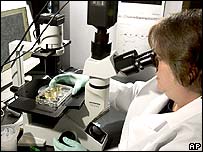 |
|
Scientists say stem cell research can help cure rare diseases (Photo: AP) |
Across the European Union, countries have varying laws and attitudes towards stem cell research. The United Kingdom actively encourages this field and allows scientists to experiment on embryos.
Some countries, notably Germany, oppose any stem cell research that involves embryo destruction.
Germany, where memories of the Nazi regime’s experiments during World War II still loom large, opposes this research and wants to ensure that European leaders prevent funding for it.
Last month, the European Parliament voted narrowly to continue funding for stem cell research.
However, as this decision was presented to the ministers in the European Council on Monday, scientists expressed concern that some countries would find ways to block it.
Germany, Poland, and Austria are known to be particularly cautious about funding scientific and medical research involving stem cells related to human embryos. Their argument is that obtaining stem cells leads to embryo destruction, and the EU should not fund this.
Nevertheless, scientists in the UK have written to the Council of the European Union stating that blocking funding would be a setback for patients worldwide—those who are now hoping that stem cells will help develop treatments for diseases such as Alzheimer’s and Parkinson’s.


















































